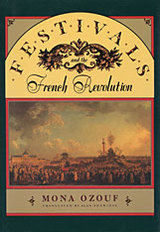
Two centuries later, the French Revolution—that extraordinary event that founded modern democracy—continues to give rise to a reevaluation of essential questions. The ambition of this magnificent volume is not only to present the reader with the research of a wide range of international scholars on those questions, but also to bring one into the heart of the issues still under lively debate.
Its form is as original as its goal: neither dictionary, in the traditional sense of the word, nor encyclopedia, it is deliberately limited to some ninety-nine entries organized alphabetically by key words and themes under five major headings: events, including the Estates General and the Terror; actors, such as Marie Antoinette, Marat, and Napoleon Bonaparte; institutions and creations, among them Revolutionary Calendar and Suffrage; ideas, covering, for example, Ancien Régime, the American Revolution, and Liberty; and historians and commentators, from Hegel to Tocqueville. In addition, there are synoptic indexes of names and themes that give the reader easy access to the entire volume as well as a key to its profound coherence.
What unifies all the varied topics brought together in this dictionary is their authors’ effort to be “critical.” As such, the book rejects the dogmatism of closed systems and definitive interpretations. Its aim is less to make a complete inventory of the findings of the history of the French Revolution than to take stock of what remains problematical about those findings; this work thus offers the additional special quality of incorporating the rich historiographical literature unceasingly elaborated since 1789.
With A Critical Dictionary of the French Revolution, François Furet and Mona Ozouf invite the reader to recross the first two centuries of French democracy in order to gain a better understanding of the origins of the world in which we live today.

Festivals and the French Revolution—the subject conjures up visions of goddesses of Liberty, strange celebrations of Reason, and the oddly pretentious cult of the Supreme Being. Every history of the period includes some mention of festivals, although most historians have been content either to ridicule them as ineffectual or to bemoan them as repugnant examples of a sterile, official culture. Mona Ozouf shows us that they were much more than bizarre marginalia to the revolutionary process. Festivals offer critical insights into the meaning of the French Revolution; they show a society in the process of creating itself anew.
Historians have recognized the importance of the revolutionary festival as a symbol of the Revolution. But they have differed widely in their interpretations of what that symbol meant and have considered the festivals as diverse as the rival political groups that conceived and organized them. Against this older vision, Ozouf argues for the fundamental coherence and profound unity of the festival as both event and register of reference and attitude. By comparing the most ideologically opposed festivals (those of Reason and the Supreme Being, for instance), she shows that they clearly share a common aim, which finds expression in a mutual ceremonial and symbolic vocabulary. Through a brilliant discussion of the construction, ordering, and conduct of the festival Ozouf demonstrates how the continuity of the images, allegories, ceremonials, and explicit functions can be seen as the Revolution’s own commentary on itself.
A second and important aim of this book is to show that this system of festivals, often seen as destructive, was an immensely creative force. The festival was the mirror in which the Revolution chose to see itself and the pedagogical tool by which it hoped to educate future generations, Far from being a failure, it embodied, socialized, and made sacred a new set of values based on the family, the nation, and mankind—the values of a modern, secular, liberal world.

Ozouf uses the woman's portrait, traditionally a male genre, to portray ten French women of letters whose lives span the period from the eve of the French Revolution to the resurgence of the feminist movement in the late twentieth century. She studies the letters and memoirs of Mme du Deffand, Mme de Charrière, Mme Roland, Mme de Staël, Mme de Rémusat, George Sand, Hubertine Auclert, Colette, Simone Weil, and Simone de Beauvoir. Rejecting the male constructions of femininity typical of this genre, Ozouf restores these women's voices in order to study their own often-conflicted attitudes toward education, marriage, motherhood, sex, and work, as well as the dilemma of writing in a literary world that did not support women's work.
Ozouf claims that a uniquely French feminism informed these women's lives, one that stems from the great egalitarian spirit of the French Revolution and is more tolerant of difference than its American counterparts. She argues that as a result, modern French culture has not isolated women from men in the same ways as American and British cultures have done.
READERS
Browse our collection.
PUBLISHERS
See BiblioVault's publisher services.
STUDENT SERVICES
Files for college accessibility offices.
UChicago Accessibility Resources
home | accessibility | search | about | contact us
BiblioVault ® 2001 - 2024
The University of Chicago Press









